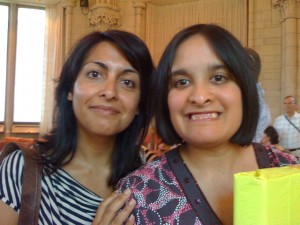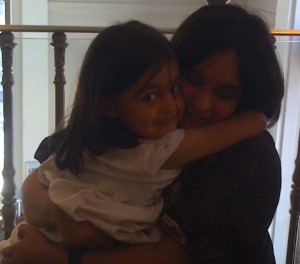When, where, why and how much were you last really happy? It’s important, because the government plans to spend £2m on measuring our happiness.
For me, it was 2pm last Saturday in a checkout queue in Sainsbury’s, Ringwood, Hampshire. The standout moment of happiness was thanks to my youngest sister, who has Fragile X syndrome, and the charity Camphill. As for how happy I was (forgive the veering into Tom Cruise-esque sofa-jumping territory), it was a pure, punch-the-air-feelgood that catapulted my stomach upwards and made me want to hug my fellow shoppers.
While I avoid supermarkets on Saturdays – they are the next rung down on the ladder of hell from a weekend family trip to Ikea – I would join that checkout queue every week if it made me as happy as I was a few days ago.
So, happiness policy wonks, here’s one way to spread the love.
It’s Saturday and I’m visiting my 21-year-old sister, Raana, at the Camphill Lantern Community in Ringwood which she moved to in September from a Camphill college in Wadhurst, East Sussex. The Lantern is an adult community for the learning disabled which aims to foster greater independence in those who live and work there. Supported by staff and volunteers, Raana enjoys life in a shared house, is proud of her work in the shop and of her new skills in the bakery, has joined a local gym and is planning her Christmas shopping in Bournemouth.
Saturday is her shopping day so we’re at the supermarket. I’m impressed that my crowd-hating sister ducks and dives through bodies and baskets like a retail pro while I’m all at sea in an unfamiliar store. My sister’s enthusiasm and confidence hint at what is to follow…
We queue and, as her shopping is scanned, I remember she needs to top up her phone card and buy stamps. From ordering in restaurants to buying train tickets, communication with strangers has always been tricky so, like the rest of my family, I’ve become used to speaking up for her. We usually encourage her to make a stab at speaking for herself but, with the queue snaking behind us, for practical as well as historical reasons, I launch into support-mode autopilot: “And can we have…”
But suddenly my sister pierces the air with: “Can I have some stamps please?’ and I’m left gawping while an unprecedented exchange takes place:
Checkout girl: “Of course – what sort?”
Me (eyes wide as you’d like the checkout aisle to be): “…….!”
My sister: “Book of 12, first class please.”
Checkout girl: “Anything else?”
Me: “RAANA!?”
My sister (nonchalant, in control, ignoring my beaming face): “Yes, a top up on my phone card please.”
Checkout girl: “That’s it?”
My sister: “Yes, I’m paying on a card.”
Me: (grinning, restraining a high five, elbowing Tom off Oprah’s sofa): “RAANA! YOU’VE DONE YOUR OWN SHOPPING!”
Checkout girl and my sister look at me. I feel silly, but very happy.
My sister was clear, confident, polite and – and here’s the thing – her behaviour would have appeared to most people to be entirely unremarkable. She fitted in.
It’s the little things in life that matter – running errands might not be your idea of achievement, but for my sister, making a shopping list or paying for something herself reflects her growing independence. She is benefitting from the holistic approach to social care and education that she has enjoyed since the age of 16, when we first came across the Camphill movement.

“You’ve not replied to emails this week,” I say later. “I’m very busy!” she replies, indignantly. Raana is sometimes too busy working, learning and socialising to contact us – this is a sign of independence and security because when stressed, she bombards us with texts (my sister is phone-phobic, but I hope one day to have a telephone conversation with her). For the first time, she shares some common ground with her mainstream peers – the “too busy to phone home” line is not dissimilar to the one I’ve peddled since I was her age.
But the spending squeeze threatens to undermine the support provided by organisations like Camphill because the councils which fund those who live there will be reluctant to keep footing the bill. Local government bureaucracy and money wrangles along with government cuts to councils are huge threats to disability organisations.

Cuts have to be made, but the axe is falling on those who need it most.
To return to the happiness survey, the correlation between happiness and strong welfare and social support is well-documented. For example, as social policy professor Alan Walker notes, ‘social quality’ is key to measuring happiness; he defines social quality as how much people are able to participate in society under conditions that enhance their individual potential and wellbeing. Social quality is commonly used in European social policy and, says Walker, the essential foundations of social happiness include health care, housing, employment-related benefits and additional forms of social assistance.
Money alone won’t ever make you happy, but taking it away from social support, and from those who need it most, not only adversely affects their well-being, but that of others around them. And what’s more, the support my sister and her peers receive today unlocks their potential, enabling them to play their part in society tomorrow.
I’m sure the £2m plan to measure the nation’s happiness will include complex statistical science and a multitude of boxes to tick but I quite like this rather more simple equation:
Vulnerable person + resources x specialised support = happiness

